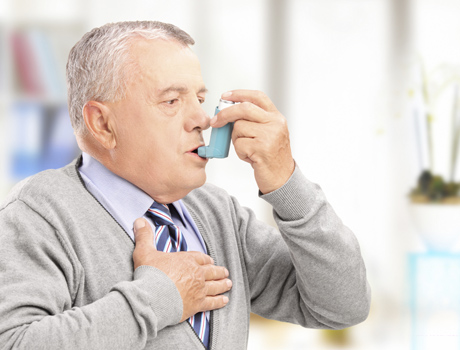Information you need to live a happy, worry-free retirement!
The Under-Diagnosed Disease that Will Take Your Breath Away

By Liz Coplen
As the Baby Boomers approach the golden years we are seeing an overwhelming number of health-related issues, one of those being asthma.
More than one million American adults older than the age of 65 are diagnosed with asthma, affecting up to seven percent of adults in this age range. While those numbers are frighteningly high, asthma is one of the most under-diagnosed diseases in the United States, especially among older adults. My grandmother is one of those seniors living with this condition.
There can be many challenges living with asthma as a senior, but with routine checkups accompanied by proper medication, the right attitude and paying specific attention to your surroundings, many of these obstacles can be overcome.
Diagnosing
Asthma diagnosis can be difficult in the geriatric population. Keeping an eye out for shortness of breath, wheezing, chest tightness and cough may help identify and diagnose asthma. If you experience any of these systems you should report them to your doctor. Extreme feelings of fatigue may also be a factor. Reviewing your medical history with your primary care provider is essential. The assessment of the severity of asthma in elderly patients should be based on demonstration and quantification of reversible obstructive airway disease by pulmonary function testing. It is important not to misdiagnose asthma as Chronic Obstructive Pulmonary Disease (COPD) because asthma has a different natural history and a better prognosis with treatment. COPD is mainly a disease of smokers.
Treatment
Elderly people do not respond as well to drug treatment as young people, so prescriptions must not be overused as they may aggravate other medical conditions like cardiac disease and arthritis. Asthma can be kept at bay with inhalers and medication, but control of environmental factors is vital to preventing an attack. If you are using your inhaler more than twice a week, seek advice from your physician.
Preventive Care
Common asthma triggers can be pet dander, cigarette smoke, mold, dust mites, pollen and extreme weather (cold and windy days being the most difficult for most seniors). Knowing and avoiding these triggers is the most proactive response. If your friends invite you to dinner in their home and they are smokers and keep a house full of cats, try suggesting a nice restaurant instead. With a little explanation and reminding, they will understand and all will be safer and happier for it. Indoor allergens may be more important to evaluate than outdoor allergens since most elderly people spend more time in their homes than outside.
Challenges
Living with asthma can not only be physically demanding, it can also take a toll on you emotionally, leaving you feeling depressed, isolated and secluded from family and friends. Depression is also one of the most treatable problems in the elderly so this should not be ignored. Good communication skills with family and friends can help lessen the stress of living with asthma.
When speaking with my grandma about how she deals with asthma, she shared many useful tips. “When I know that I cannot do to much at one time, spacing activities out helps keep me from feeling fatigued or overwhelmed.” Remember, extreme fatigue may increase the likelihood of an attack. “I also watch for cold or rainy and windy days,” she said. “Those days, staying indoors helps me breathe better.”
So while it can be difficult and life changing living with asthma, it is something that can be dealt with by routine visits to your primary care physician, assessing your environment and, most importantly, talking about your issues to the people and loved ones in your life.



